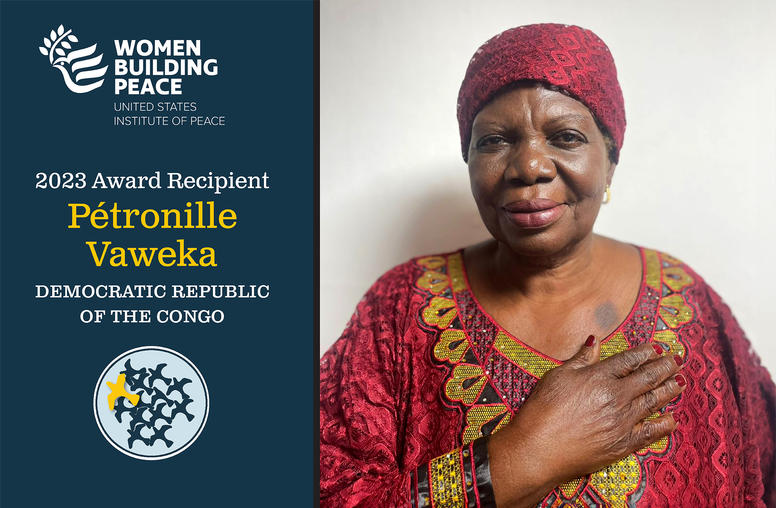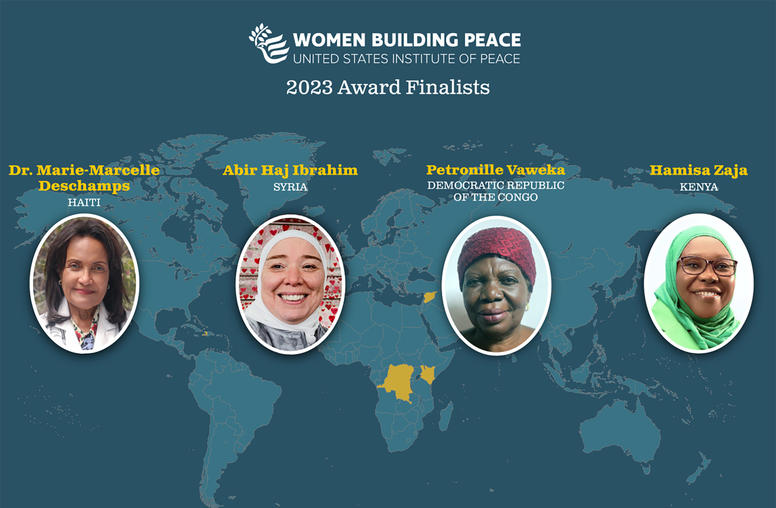Digitally Bridging the Divide in Kosovo
Waitt Family Foundation donates computers to Kosovar Albanian and Serb leaders at Institute organized conference.
Can the Internet and e-mail succeed in helping to establish a foundation for open communications and peaceful coexistence between Albanian and Serb communities in Kosovo? In the mind of at least one man, Ted Waitt -- co-founder of Gateway Computers and the Waitt Family Foundation -- the answer to this question is an enthusiastic yes.
Surpassing all expectations, Kosovo Albanian and Serb community leaders in a recent meeting organized by the United States Institute of Peace established a new and historic level of dialogue. Through a series of frank and often difficult discussions, participants in the workshop on multi-ethnic coexistence were able to overcome the still raw wounds from years of virulent ethnic conflict in Kosovo and agree upon joint steps towards a better future for Kosovo. Resulting in the landmark "Airlie Declaration Against Violence," the participants came to key agreements on what they believe are important aspects of rebuilding civil society in Kosovo. Yet, could the lines of communication between the Kosovo Albanian and Serb community leaders be maintained once the 40 signatories of the Airlie Declaration returned to their respective homes and lives in Kosovo?
Making good on their record of "…applying cutting-edge technology to build stronger communities and help families in need," the Waitt Family Foundation donated computers to each of the Kosovar Albanian and Serb leaders present -- providing the participants with both a means and method to continue the dialogue started during the workshop. Delivered at a surprise dinner presentation toward the end of the workshop, the laptop-computers in the words of Waitt Foundation President John Heubusch, "are meant to serve as a digital bridge to help these brave leaders traverse the historic divide between ethnic Albanians and Serbs in Kosovo."

Al Panico of the Waitt Family Foundation
presents Gateway laptop computers to the delegation.
(USIP Photo)
Finding a Creative Way to Help
The Airlie computer donation, made at the behest of Mercy Corps International, is not the Waitt Foundation's first foray into international affairs. Touched by the tragedy of the crisis, the Waitt Family Foundation, under Ted Waitt's direct guidance first became involved in the Balkans during the Kosovo refugee crisis last year. In a short time the Waitt Foundation in fact, actually became a leading player in organizing last year's public-private Kosovo Refugee Internet Assistance Initiative. According to Waitt Foundation President John Heubusch, "Ted was very concerned about the situation and wanted to find a creative way to use technology to help reunite the families that were dispersed through the various refugee camps throughout Europe."
A Waitt Foundation -- Institute Partnership
Fresh off the assembly line, the Gateway laptop computers were purchased, through a grant from the Waitt Foundation and delivered to the participants at the workshop by Mercy Corps International. According to Workshop Vice-Chair and Institute Executive Vice-President Harriet Hentges, "When I heard that the Waitt Family Foundation and Mercy Corps were working to support our efforts here at Airlie I was delighted. Having previously heard of the Waitt Foundation's work with the Kosovo Refugee Internet Assistance Initiative, I thought that their involvement in this initiative would be quite a natural partnership as well as provide a critically important follow-on to its earlier efforts to keep families together. This time it's helping to build a community."
Reflecting on the significance of these donations, Institute Balkans Initiative Director and workshop co-organizer Daniel Serwer added: "I think that the workshop participants were really touched by the combined generosity of the Waitt Family Foundation and Mercy Corps. I applaud John Menzies of the U.S. State Department, Landrum Bolling of Mercy Corps, and the many others who worked behind the scenes to make these wonderful gifts a reality."
In a dramatic last minute show of support for the Albanian-Serb dialogue, the editor of the independent Albanian news magazine Koha Ditore, supplemented the Waitt-Mercy Corps computer donation with a one-year pledge of Internet service for all workshop participants who live or work in Pristina. The Institute, in conjunction with Mercy Corps, has also pledged to assist in working out the technical arrangements that will allow the dialogue to continue over the Internet in support of implementing the agreements reached by the participants at Airlie.
Discussing Multiethnic Coexistence
One of the first meetings between Kosovar Albanian and Serb community leaders since the NATO intervention last year in Kosovo, the Airlie workshop was organized by the United States Institute of Peace at the request of the U.S. Department of State, with support from the U.S. Agency for International Development and World Learning. Areas of concern where the participants reached consensus during the three-day workshop included elections, media, security, and refugee returns. Workshop participants included such community leaders as Serbian Orthodox Bishop Artemije Radosavljevic, non-violent resistance leader Ibrahim Rugova, and former KLA leader Hashim Thaci.
The Airlie workshop was the latest activity of ongoing Institute efforts to help facilitate communications and relations amongst community and political leaders in Kosovo. Previously this year, the Institute had organized a workshop in Southeastern Kosovo (Gjilan-Gnjilane area) for Serb and Albanian community leaders at the request of the U.S. Army. This workshop was preceded by separate consensus-forming sessions for Albanian and Serb community leaders conducted in the fall of 1999. The resulting "Lansdowne" and "Sofia" declarations from each of these meetings formed the basis for discussion for the participants during the Airlie workshop on Multiethnic Coexistence.
About the United States Institute of Peace
The United States Institute of Peace was established by Congress in 1984 as a result of a decades-long public campaign to create a national peace academy. An independent, nonpartisan, and federally funded institution, the Institute works to strengthen our national capabilities for managing and resolving international conflicts without resort to military action. Through its education, research, training and other programs the Institute endeavors to provide a resource base for policymakers, researchers, and the public to address the challenges to international peace and stability found in today's post-Cold War world. The Institute is governed in its efforts by a 15-member, bipartisan board of directors who are appointed by the President of the United States and confirmed by the Senate.
About the Balkans Initiative
Responding to the need to bolster implementation of the Dayton Peace Accords in Bosnia, the Institute's Board of Directors created the Balkans Initiative in 1995. Designed to draw upon the Institute's unique pool of talent and resources, the Balkans Initiative works on both the policy level and in the field to promote research and discussion of important issues to assist in the prevention of future conflicts in the Balkans.
Examples of the Institute's ongoing efforts on the Balkans include:
The Balkans Working Group -- In Washington, D.C, the Institute's Balkans Working Group, attracts representatives from government agencies, relief organizations, military services, and human rights groups in an effort to explore issues and turn research into viable policy options for both the public and private sectors. In 1999 alone over 800 participants in total attended the 17 meetings held by the Balkans Working Group.Grants Awards -- Institute grants have put resources into the hands of local groups providing the means to build a stable foundation for peace and reconciliation throughout the Balkans. Since 1992 the Institute has awarded over $3 million in grants to support Balkans-related efforts. This has included funding projects to examine key obstacles to refugee return and resettlement issues in Bosnia and projects to train, educate, and coordinate peace activist networks throughout Southeastern Europe.
Resident Fellowships -- As part of the Institute's world renowned Jennings Randolph Fellowship Program, The Institute over the past several years has brought an impressive array of distinguished scholars, journalists, and diplomats to the Institute to study and conduct research. Recent fellows include Serbian independent journalist Stojan Cerovic, award winning journalist and former editor of Oslobodjenje Kemal Kurspahic, and Serbian opposition leader Vesna Pesic.
About the Waitt Family Foundation & Mercy Corps International
Founded by Ted Waitt, co-founder of the Gateway Computer Corporation, the Waitt Family Foundation's Technology Resource Center is dedicated to empowering communities and enabling them to participate fully in the digital information age. Mercy Corps International, initially founded in 1979 as Save the Refugees Fund, exists to alleviate suffering, poverty and oppression by helping people build secure, productive and just communities. Since 1979, Mercy Corps has provided over $450 million in assistance to people in more than 68 countries.
The United States Institute of Peace is an independent institution created and funded by Congress to promote research, education, and training on the peaceful resolution of international conflicts. Since 1995, the Institute's Balkans Initiative has played an important role in creating a forum for discussion among government and non-government experts to assist in building consensus on key issues in the Balkans.
The Airlie workshop was the fourth in a series of Institute-facilitated discussions amongst Kosovar community leaders.

